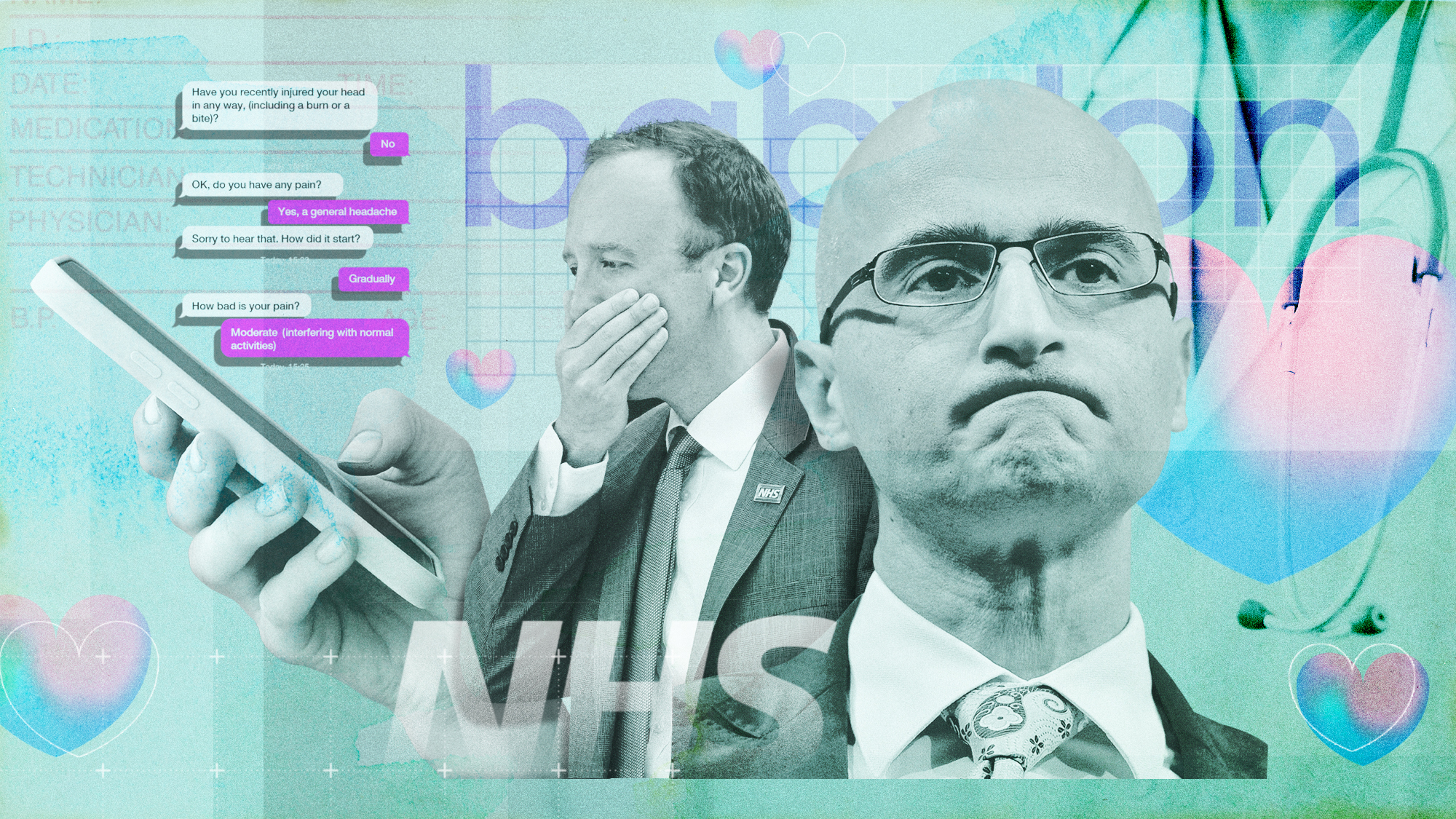Babylon Health: the failed AI wonder app that 'dazzled' politicians
Demise of UK tech start-up is a cautionary tale for politicians seeking quick fixes to complicated problems

Babylon Health, the UK tech start-up once valued at billions of dollars that collapsed in August, was only ever "smoke and mirrors", a former employee has said.
The rise and dramatic fall of the healthcare app, backed by senior politicians like the then health secretary Matt Hanock, who saw it as a panacea to cutting NHS waiting times, is more than a classic case of over-promising and underdelivering.
"The whole sorry and dangerous story is a symptom," said Sam Leith in The Spectator ,"of arts graduate politicians being idiotically dazzled by the idea of technological miracles and prepared to take any old rubbish on trust if the two letters 'AI' are involved."
Subscribe to The Week
Escape your echo chamber. Get the facts behind the news, plus analysis from multiple perspectives.

Sign up for The Week's Free Newsletters
From our morning news briefing to a weekly Good News Newsletter, get the best of The Week delivered directly to your inbox.
From our morning news briefing to a weekly Good News Newsletter, get the best of The Week delivered directly to your inbox.
What did Babylon aim to do?
Babylon Health was a London-based startup that aimed to "revolutionise healthcare" by putting an AI-powered "doctor in your pocket". Founded in 2013 by Ali Parsa, a British-Iranian banker, it was once hailed as the future of the NHS by Matt Hancock, the then health secretary. In 2018, Parsa claimed that its chatbot was better than a real doctor; that it had passed a medical exam with a score of 81%, when the average mark for human doctors at the time was 72%. The company raised hundreds of millions in funding, signed NHS deals on the back of overblown marketing claims, and soared on its New York stock market launch in October 2021 to a valuation of $4.2bn (£3.1bn) – before crashing into bankruptcy this summer.
What products did Babylon offer?
It had two main products. "GP at hand" was a telehealth service that would connect people to NHS doctors on videocalls. This was "helpful... but not exactly revolutionary", said Grace Browne in Wired; the service still exists today. The second, more game-changing offering was a symptom-checking bot, launched in 2017 – supposedly an easier, faster way of accessing medical care.
By performing triage and assessing symptoms, the chatbot would reduce pressure on doctors' time, and help them make diagnoses, it claimed – thereby cutting waiting lists and slashing care costs. This was music to the ears of investors, healthcare officials and government ministers alike. According to Parsa, Babylon would "do with healthcare what Google did with information" – making it "accessible and affordable to every human being on Earth".
What happened next?
From its plush Knightsbridge offices, Babylon became one of the fastest-growing startups in healthcare history. Between 2013 and 2021, it raised $1.2bn (£876m) from investors, including Saudi Arabia's sovereign wealth fund and Demis Hassabis, the founder of DeepMind, Google's AI arm. In the past three years alone, it has received at least £22m from the NHS. Employees say Parsa was obsessed with "blitzscaling" – the "lightning-fast path" to building valuable companies popularised by LinkedIn's co-founder Reid Hoffman, in his book of the same name. The company went on wild hiring sprees; the sales team would bang a gong every time they made a sale. But it became clear to many insiders that all was not well at Babylon.
What went wrong?
The GP at hand service expanded fast to serve 100,000 patients, via deals with various NHS trusts. But its "ease of use", reported The Sunday Times, meant its patients asked "for far more appointments than is typical". Because the NHS pays GPs a flat fee per patient a year, of around £160, regardless of how much care they require, Babylon was soon losing money on every patient it saw. It needed the chatbot to save money by "automating away" consultations.
What happened to the chatbot?
It did not live up to expectations. One former employee, Hugh Harvey, a doctor, said that the company's "AI algorithm" was little more than a standard medical if/then "decision tree" set out in an Excel spreadsheet. He remembers thinking: "This isn't really artificial intelligence." Another critic, the oncologist David Watkins, pointed out that its supposedly all-seeing app failed to spot symptoms of a heart attack, and at times diagnosed an ingrown toenail as gout. In 2017, the Care Quality Commission raised concerns. In 2018, The Lancet concluded that there was no evidence that Babylon's chatbot worked better than a doctor, and there was "a possibility that it might perform significantly worse".
How did it all end?
Although Parsa's own fortune grew to an estimated £825m after the flotation, Babylon failed to make a profit and burned through hundreds of millions of dollars in funding. Eventually it had to withdraw from its loss-making NHS contracts; a move into the US market was even more disastrous. And there was a growing sense that the chatbot was a triumph of aggressive Silicon Valley-style marketing – or just old-fashioned smoke and mirrors – over substance. Within 18 months of floating, Babylon's shares had fallen by 99% – a situation described by Parsa as an "unmitigated disaster". Despite attempts to steady the ship, the company's accumulated deficit spiralled past $900m earlier this year, leading it to file for bankruptcy in the US in August, and in the UK soon afterwards. Its UK assets have since been sold off for £500,000.
What are the lessons of the story?
Babylon is not the first digital health startup "to struggle to move from hype to commercial success", said Wired: other examples include the blood-testing firm Theranos, and IBM's Watson Health, which, like Babylon, was sold for parts. "There's an inherent mismatch between the move-fast-break-things culture of tech startups and that of healthcare, where caring for patients requires thoughtfulness and context." Ultimately, it's hard to replace doctors with algorithms – though investors and politicians loved the idea of doing so.
What role did politicians play?
All along, Babylon's success was underpinned by close links with the Conservative Party. In 2018, Matt Hancock wrote approvingly about Babylon in an advertorial in the Evening Standard (then edited by former chancellor George Osborne), while Dominic Cummings, who served as Boris Johnson's chief adviser, was contracted briefly as a consultant. Such admiration was mutual: individuals and companies connected with Babylon donated more than £250,000 to the Conservatives – including £10,000 to Hancock's failed 2019 leadership bid. The saga of Babylon, at the very least, exposes the worrying lack of technical nous often prevalent among British politicians and civil servants.
A free daily email with the biggest news stories of the day – and the best features from TheWeek.com
-
 A tall ship adventure in the Mediterranean
A tall ship adventure in the MediterraneanThe Week Recommends Sailing aboard this schooner and exploring Portugal, Spain and Monaco is a 'magical' experience
-
 How drone warfare works
How drone warfare worksThe Explainer From Ukraine to Iran, it has become clear that unmanned aircraft are rapidly revolutionising modern warfare
-
 The tourist flood in the Mediterranean: can it be stemmed?
The tourist flood in the Mediterranean: can it be stemmed?Talking Point Finger-pointing at Airbnb or hotel owners obscures the root cause of overtourism in holiday hotspots: unmanageable demand
-
 A disproven medical theory could be guiding RFK Jr.'s health policy
A disproven medical theory could be guiding RFK Jr.'s health policyThe Explainer The miasma theory is one of the oldest medical beliefs in history
-
 Orthorexia nervosa: when clean eating goes too far
Orthorexia nervosa: when clean eating goes too farThe Explainer Being healthy is fine, but obsessing over it is dangerous
-
 The marvelous powers of mucus
The marvelous powers of mucusThe Explainer It's snot just a pesky cold symptom
-
 The New World screwworm is making a deadly comeback
The New World screwworm is making a deadly comebackThe explainer The parasite is spreading quickly
-
 Women need more pain management during gynecological procedures
Women need more pain management during gynecological proceduresUnder the radar Pain should no longer be ignored
-
 How the care industry came to rely on migrant workers
How the care industry came to rely on migrant workersThe Explainer Government crackdown on recruiting workers abroad risks deepening care sector crisis, industry leaders warn
-
 Could medics' misgivings spell the end of the assisted dying bill?
Could medics' misgivings spell the end of the assisted dying bill?Today's Big Question The Royal College of Psychiatrists has identified 'serious concerns' with the landmark bill – and MPs are taking notice
-
 Protein obsession is oversaturating the health food space
Protein obsession is oversaturating the health food spaceUnder the Radar Some experts say that fiber is now the most important macro to focus on